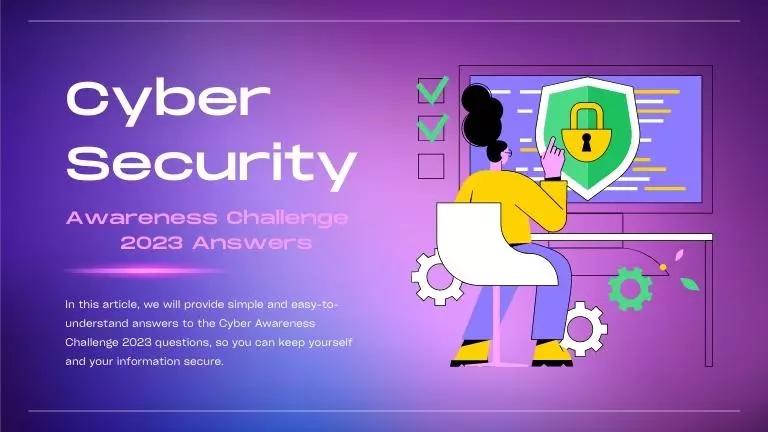In today’s digital world, it’s important to know how to stay safe online. The Cyber Awareness Challenge 2023 can help you learn about cybersecurity and how to protect yourself from online dangers.
In this article, we will provide simple and easy-to-understand answers to the Cyber Awareness Challenge 2023 questions, so you can keep yourself and your information secure.
Understanding Cybersecurity
Cybersecurity means staying safe on the internet. It’s important because there are people who try to steal your information or harm your computer. Here are some common online threats:
- Malware: Bad software that can damage your computer or steal your information.
- Phishing: Tricking you into giving out personal information like passwords or credit card numbers.
- Social Engineering: Tricking you into doing something you shouldn’t, like clicking on a harmful link.
- Data breaches: When someone gets unauthorized access to your personal information.
- Ransomware: Holding your information hostage and demanding money to release it.
Cyber Awareness Challenge 2023 Overview
The Cyber Awareness Challenge 2023 is a program to help you learn how to stay safe online. Here’s what you need to know:
- Purpose of the Challenge: To teach you how to protect yourself from online threats.
- Key Objectives: The important things you will learn in the challenge are:
- Using strong passwords that are hard for others to guess.
- Being careful about emails or messages that ask for your personal information.
- Keeping your computer and software up to date.
- Being aware of tricks people use to try and get your information.
- Protecting your mobile devices from online dangers.
- Making backups of your important information.
- Using secure Wi-Fi networks.
- Adding extra security to your online accounts.
- Being cautious when browsing the internet.
- Reporting any problems you have to the right people.
Cyber Awareness Challenge 2023 Answers
Here are the answers to the Cyber Awareness Challenge 2023 questions:
- Password Security
- Use strong and hard-to-guess passwords for your online accounts.
- Don’t use your name or birthdate as a password.
- Try using a password manager to help you remember your passwords.
- Phishing Awareness
- Be careful of emails or messages that ask for personal information.
- Make sure to check if the website you’re on is real before giving any information.
- Use antivirus software to help protect you from phishing.
- Software Updates
- Keep your computer and software up to date.
- Updates help fix problems and make your computer safer.
- It’s important to always have the latest updates installed.
- Social Engineering
- Be careful of people trying to trick you into doing something you shouldn’t.
- Don’t give out personal information to people you don’t know or trust.
- Learn about common tricks used by scammers to stay safe.
- Mobile Device Security
- Set a strong passcode or use your fingerprint to unlock your device.
- Only download apps from trusted sources like official app stores.
- Install security apps to help protect your device from threats.
- Data Backup and Recovery
- Make backups of your important files regularly.
- This way, if something happens to your device, you won’t lose all your information.
- Test your backups to make sure they are working.
- Secure Wi-Fi Networks
- Connect to Wi-Fi networks that have passwords.
- Avoid using public Wi-Fi for sensitive activities like banking.
- Consider using a Virtual Private Network (VPN) for added security.
- Two-Factor Authentication
- Use two-factor authentication for your online accounts.
- This adds extra security by requiring a second verification step, like a code sent to your phone.
- Safe Browsing Habits
- Be careful when visiting websites and clicking on links.
- Avoid suspicious websites that might have harmful content.
- Clear your browsing history regularly.
- Incident Reporting
- If something goes wrong online, report it to the right people.
- Tell your parents, teacher, or an adult you trust.
- They can help you take the right steps to fix the problem.
Conclusion
Learning about cybersecurity is important for staying safe online. By understanding the answers to the Cyber Awareness Challenge 2023 questions, you can better protect yourself and your information from online threats.
Remember to use strong passwords, be careful of phishing attempts, keep your devices and software up to date, and follow safe browsing habits. If you ever encounter a problem, don’t hesitate to report it to someone you trust. Stay safe and enjoy your time online!
Frequently Asked Questions (FAQs)
How often should I change my passwords?
It’s a good idea to change your passwords every few months to keep them secure.
How can I tell if an email is trying to trick me?
Watch out for emails that ask for personal information or have spelling mistakes. They might be trying to trick you.
Why are software updates important?
Software updates fix problems and make your computer more secure. It’s important to always have the latest updates.
What is social engineering?
Social engineering is when someone tricks you into doing something you shouldn’t, like giving out personal information.
How can I protect my phone from online dangers?
Set a strong passcode, only download apps from trusted sources, and install security apps to protect your phone.











